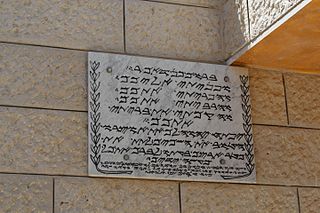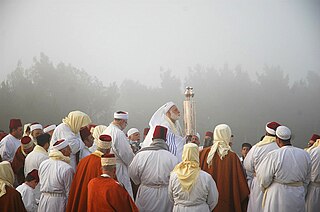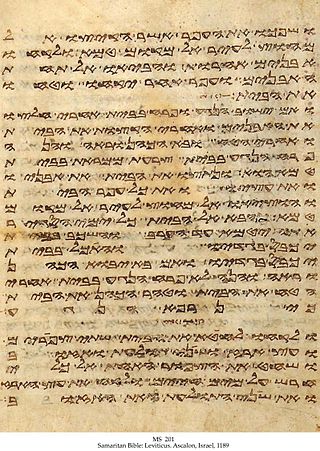Bad Samaritans or Bad Samaritan or variation, may refer to:
The Pentateuch is the first part of the Bible, consisting of Genesis, Exodus, Leviticus, Numbers, and Deuteronomy.

Samaritanism is the Abrahamic, monotheistic, ethnic religion of the Samaritan people, an ethnoreligious group who, alongside Jews, originate from the ancient Israelites. Its central holy text is the Samaritan Pentateuch, which Samaritans believe is the original, unchanged version of the Torah.

Samaritans are an ethnoreligious group who originate from the ancient Israelites. They are native to the Levant and adhere to Samaritanism, an Abrahamic and ethnic religion.
Uzzi is a given name. One derivation is biblical, from Uzzî meaning "my strength". The name can also be transliterated as Uzi. It may be a nickname for Uzza/Uzzah, Uzzia/Uzziah, and Uziel/Uzziel.

The Samaritan Torah, also called the Samaritan Pentateuch, is a text of the Torah written in the Samaritan script and used as sacred scripture by the Samaritans. It dates back to one of the ancient versions of the Hebrew Bible that existed during the Second Temple period, and constitutes the entire biblical canon in Samaritanism.
Samaritans is a registered charity aimed at providing emotional support to anyone in emotional distress, struggling to cope or at risk of suicide throughout the United Kingdom and the Republic of Ireland, often through its telephone helpline. Its name derives from the biblical Parable of the Good Samaritan although the organisation itself is not religious.

Good Samaritan laws offer legal protection to people who give reasonable assistance to those who are, or whom they believe to be injured, ill, in peril, or otherwise incapacitated. The protection is intended to reduce bystanders' hesitation to assist, for fear of being sued or prosecuted for unintentional injury or wrongful death. An example of such a law in common-law areas of Canada: a Good Samaritan doctrine is a legal principle that prevents a rescuer who has voluntarily helped a victim in distress from being successfully sued for wrongdoing. Its purpose is to keep people from being reluctant to help a stranger in need for fear of legal repercussions should they make some mistake in treatment. By contrast, a duty to rescue law requires people to offer assistance and holds those who fail to do so liable.

The parable of the Good Samaritan is told by Jesus in the Gospel of Luke. It is about a traveler who is stripped of clothing, beaten, and left half dead alongside the road. First, a Jewish priest and then a Levite come by, but both avoid the man. Finally, a Samaritan happens upon the traveler. Although Samaritans and Jews despised each other, the Samaritan helps the injured man. Jesus is described as telling the parable in response to a provocative question from a lawyer, "And who is my neighbor?", in the context of the Great Commandment. The conclusion is that the neighbor figure in the parable is the one who shows mercy to their fellow man.
Bad Boys may refer to:
A professional is someone who is skilled in a profession.

The Samaritan script is used by the Samaritans for religious writings, including the Samaritan Pentateuch, writings in Samaritan Hebrew, and for commentaries and translations in Samaritan Aramaic and occasionally Arabic.
Samaritan Hebrew is a reading tradition used liturgically by the Samaritans for reading the Ancient Hebrew language of the Samaritan Pentateuch, in contrast to Tiberian Hebrew among the Jews.

Mount Gerizim is one of two mountains in the immediate vicinity of the West Bank city of Nablus and biblical city of Shechem. It forms the southern side of the valley in which Nablus is situated, the northern side being formed by Mount Ebal. The mountain is one of the highest peaks in the West Bank and rises to 881 m (2,890 ft) above sea level, 70 m (230 ft) lower than Mount Ebal. The mountain is particularly steep on the northern side, is sparsely covered at the top with shrubbery, and lower down there is a spring with a high yield of fresh water. For the Samaritan people, most of whom live around it, Mount Gerizim is considered the holiest place on Earth.
Good Samaritan usually refers to the Parable of the Good Samaritan, a story in the Christian gospel of Luke that encourages people to help others who are in danger.
Fury or FURY may refer to:
The Samaritans are an ethnoreligious group of the eastern Mediterranean region, originating from connection with ancient Samaria.
Bad or BAD may refer to:
A bad guy or villain is a type of character in fiction and other narratives.

The Samaritan woman at the well is a figure from the Gospel of John. John 4:4–42 relates her conversation with Jesus at Jacob's Well near the city of Sychar.

The Samaritan revolts were a series of insurrections in Palaestina Prima province, launched by the Samaritans against the Eastern Roman Empire. The revolts were marked by great violence on both sides, and their brutal suppression at the hands of the Byzantines and their Ghassanid allies severely reduced the Samaritan population. The events irreversibly shifted the demographics of the region, making the Christians the only dominant group in the Palaestina Prima province for many decades onward.